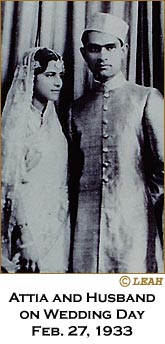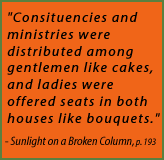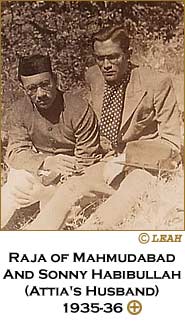5. "Kala Sahibs" [Black Sahibs] QUESTION (Omar Khan): Tell me, in your family and the circle you moved in, who was drawn to the Muslim League and why?  ATTIA HOSAIN (AH): My mother-in-law [Inam Mohammed Habibullah]. She was my aunt, 's mother, Isha'at [Habibullah's] mother, my mother's only sister. My father-in-law took her out of being in the house. My mother had to be, but my mother-in-law, because of her husband, had always been what was called then a progressive person, coming out and meeting people, the British and so on. My father-in-law lived a very British kind of a life. You know like we used to laugh sometimes and say all these "Kala Sahibs" [Black Sahibs]. Very much so. I mean though in my house also, in my home we had these Western and Eastern parts of the house, the Habibullah Household was totally that in a way. My mother-in-law was drawn into public life.
ATTIA HOSAIN (AH): My mother-in-law [Inam Mohammed Habibullah]. She was my aunt, 's mother, Isha'at [Habibullah's] mother, my mother's only sister. My father-in-law took her out of being in the house. My mother had to be, but my mother-in-law, because of her husband, had always been what was called then a progressive person, coming out and meeting people, the British and so on. My father-in-law lived a very British kind of a life. You know like we used to laugh sometimes and say all these "Kala Sahibs" [Black Sahibs]. Very much so. I mean though in my house also, in my home we had these Western and Eastern parts of the house, the Habibullah Household was totally that in a way. My mother-in-law was drawn into public life.  Then when the election time came in 1937, she wanted to be in a Council, the Legislative Council in U.P at the time. She was always inclined towards that because there wasn't the same stream of nationalist [Indian] thought in that part of the family. Q: Even though you are saying they may have been even more British in a way? AH: Yes, but they were more conformist. My father-in-law Shaikh Mohammd Habibullah [Taluqdar of Saidanpur and later Vice-Chancellor of Lucknow University] was not then in the same way as my father had been when he was growing up and influenced us. I mean, I found a letter after my father had died in which he had written about the Jalianwala Bagh incident [in 1919 when hundreds of Indians were massacred by British troops in Amritsar, Punjab] to somebody and mentioned that he talked about it to Pandit Motilal Nehru. This is going to be a turning point in the relationship between the two races. Well, my father-in-law whom I respect greatly, a man of great integrity, was not in that sense involved, [although] he was in the Legislative Council in U.P. When my mother-in-law decided to stand she was a follower of Jinnah, in the sense of the Muslim League. That ideology. She had in her a point of departure from this friendship between the two religions and so on, into being definitely a believer in the Muslim League but never of any violence with each other, but believing that the Muslims had to be like that [separate]. Then my brother-in-law, who was one of the most foremost barristers in Lucknow and later became a High Court judge before he died [joined the Muslim League]. He was brought up in this country. During the time of the First World War he had not been able to go backwards and forwards [between Britain and India] like people did when there were aeroplanes. He grew up here [in England] and went back after he had been at school, at university, at the Middle Temple [Cambridge].  [He was] A Muslim Leaguer but never believed in any Muslims leaving India and going to Pakistan. He said we are fighting for certain rights. We are fighting for certain principles but not as people to leave this country. Organising the Muslims in the same way my husband [later did]. [He was] A Muslim Leaguer but never believed in any Muslims leaving India and going to Pakistan. He said we are fighting for certain rights. We are fighting for certain principles but not as people to leave this country. Organising the Muslims in the same way my husband [later did].
He [Ali Bahadur Haibullah 1909-1982] had gone from here and had been there just a few years. Two years after he married me [1933] and he was a very young man. He had been brought up here [in England] completely. He had a very bad accident and he lost the use of half of his left hand in tiger shoot with Raja Sahib Mahmudabad. Now Raja Mahmudabad, the young man, was at that time, as you must have heard, [full of] zest in his support of the Muslim League. In fact, had he not put all his money into it, there would have been no movement in U.P. which ultimately founded Pakistan in a way. People forget him and forget his role. This was a remarkable man. Now, as a very young man, he and my husband became close to each other like brothers because when he nearly died after this accident, as it had happened with Raja Sahib during the shoot, they got closer. Raja Sahib was distantly related to me from my mother's side. But they became very close and they were like blood brothers. My husband joined him in the Muslim League but joined him completely and we would have these arguments because I was at that time involved with thinking about the Spanish Civil War, what was happening in Germany and seeing him in a uniform, upset me tremendously because he was in the Muslim [League] National Guard, was a part of that. I said "how can you possibly?" To me everybody in a uniform who is not in the army is like those [Nazi] storm troopers. Q: What I am trying to ask is that, for those people who chose the Muslim League versus people like yourself who were Indian Nationalists, do you think it was a matter of choice? Simply human beings that wanted to chose a certain area to support, or was there a sense of genuine grievance? AH:Well in the sense that I do accept that they felt [grievances]. My husband, for example said, he was one of those three or four young men who in 1940 voted against the Pakistan Resolution [demanding a separate homeland for Muslims] because he believed, we must organise and [first] become strong within ourselves against any force that will try and make, as he used to say, the Muslims like they became in Spain " hewers of wood, drawers of water. " Images © The Literary Estate of Attia Hosain (LEAH) |
| |
| SOUNDS
| HOME